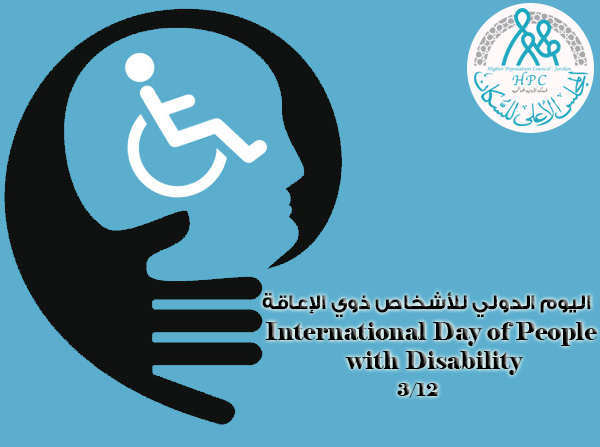

Jordan and the rest of the world mark today the International Day of Persons with Disabilities, which falls on December 3 of each year. The theme for this year is “A Day for All”, which reflects a growing understanding that disability is part of the human condition.
On this occasion, HPC secretary general, Dr. Abla Amawi, said in a special press release that 11.2% of the total Jordanian population (aged 5 and above) are persons with disabilities, with a prevalence of 11.7% among Jordanian males and 10.6% among Jordanian females. Amawi added that vision disability (visual impairment) is the most prevalent form of disability in Jordan at 6%, followed by mobility disability (walking impairment) at 4.8%, and hearing disability (hearing difficulties) at 3.1%. Amawi indicated that Aqaba governorate recorded the highest prevalence of visual impairment at 7.1% of the total Jordanian population aged 5 and above, Irbid governorate has the highest prevalence of mobility disability at 5.6%, and the governorates of Ajloun and Tafila recorded the highest prevalence rates of hearing disability, at 3.5% each. These numbers are subject to increase as the population ages and non-communicable diseases become more prevalent, according to the 2015 Population and Housing Census.
Amawi stressed that this group of the Jordanian society has different rights and needs, and requires enhanced national efforts to ensure disability in national strategies and plans. Statistics show that (23.8%), or one third, of persons with disabilities (functional impairments) aged 5 and above are not covered by health insurance, (22.3%) have not enrolled in educational institutions, and (66%), or two thirds of persons with disabilities (functional impairments) aged 15 and above are not employed or are not seeking employment.
According to a study carried out by the Higher Council for the Rights of Persons with Disabilities, (10.3%) of total children enrolled in kindergarten are children with disabilities, of which 68% are males and (32%) are females.
On the other hand, Ministry of Education statistics for the scholastic year 2018/ 2019 revealed that students with disabilities who receive MOE services amount to 21,859 male and female students with different types of disabilities, representing (1.6%) of total students. This percentage increases to (2%) if students with disabilities who received services from the Ministry of Social Development through MOSD centers and the private sector in the same year are included.
Amawi pointed out that the Higher Population Council firmly believes in the importance of disability inclusion in society and development and that persons with disabilities should enjoy their rights, dignity and decent employment opportunities. Amawi further stressed the need to ensure that refugees with disabilities in Jordan have access to basic services. A study published by the Institute of Development Studies in 2018 on the Current Situation of Persons with Disabilities in Jordan revealed that the percentage of Syrian refugees with disabilities in Jordan stands at 30%, of which 44.2% have physical disabilities, 42.5% have psychological impairments, 13.4% have intellectual disabilities, and 20% have multiple disabilities.
Furthermore, Amawi stressed that persons with disabilities should be at the heart of efforts to address and recover from the Covid-19 pandemic, as they are among the most affected groups due to their lack of access to public health information and the major barriers that hinder their adherence to basic hygiene measures, including social distancing and self-isolation, as they need other forms of support. Persons with disabilities also do not have access to health facilities and many of them will likely end up experiencing severe health conditions if they contract the virus.
Amawi stated that international agreements signed by Jordan recognize the need for policies and practices that ensure equal access to basic services. Amawi further noted that the key challenges in Jordan include weak coordination among relevant national institutions, which leads to duplication of offered services, the lack of an accurate and comprehensive disability database at relevant institutions, in addition to financial challenges.
HPC recommends paying more attention to persons with disabilities, and exerting more efforts to ensure their inclusion and access to comprehensive services and care. HPC also recommends protecting girls with disabilities against all form of violence, facilitating access to employment opportunities for persons with disabilities by operationalizing some provisions of Law No. 20 of 2017 on the Rights of Persons with Disabilities, developing vocational training programs targeting girls with disabilities and labor market needs, developing tools to measure and diagnose disabilities, and formulating appropriate treatment programs.







